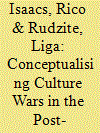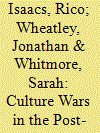| Srl | Item |
| 1 |
ID:
180491


|
|
|
|
|
| Summary/Abstract |
This essay analyses the political discourses employed by both the Belarusian authorities and the opposition with regard to homophobia and the LGBT community. It explores the anti-LGBT rhetoric and political homophobia that has been identified in the literature on Russian and Ukrainian politics as a baseline for examining neighbouring Belarus. It identifies which homophobic discourses are present in Belarus and how political homophobia is wielded by different actors on the domestic political scene.
|
|
|
|
|
|
|
|
|
|
|
|
|
|
|
|
| 2 |
ID:
180489


|
|
|
|
|
| Summary/Abstract |
This essay establishes a framework for analysing culture wars in the post-communist space. Using Latvia’s debate over the ratification of the Istanbul Convention on violence against women, it outlines the central features of culture wars: moralisation, externalisation of agency, the instrumentalisation of culture and the struggle for power and resources. While existing scholarship conceptualises culture wars as a dichotomous battle between the sacred and the secular, or between liberal and illiberal, our thematic analysis of the Istanbul Convention debate in Latvia finds it was less about culture and more a complex struggle between political and religious actors competing for power and resources.
|
|
|
|
|
|
|
|
|
|
|
|
|
|
|
|
| 3 |
ID:
180488


|
|
|
|
|
| Summary/Abstract |
In the last decade the term culture war has become hard to avoid. If it is not yet the buzzword of the first part of the twenty-first century, it soon will be. Culture wars seem to be around us everywhere. Each passing week brings some new mention of an outbreak in a public institution, civic space or political arena in some part of the globe. Culture wars are the phenomenon we cannot seem to shake. Battle lines are drawn, rhetorical tools are sharpened and social media awash with vitriol and moralising, and seemingly unbridgeable social gaps. If the immediate post-Cold War period did usher in an era of universal global liberalism, decades on it is now far in the distance, only visible in the rear-view mirror. Instead, around us lie social and political fault lines featuring competing visions of what should be the appropriate normative basis upon which societies should be constituted. They are debates that focus on belonging, on citizenship, on rights and identities.
|
|
|
|
|
|
|
|
|
|
|
|
|
|
|
|
| 4 |
ID:
180490


|
|
|
|
|
| Summary/Abstract |
This essay explores the controversial restrictions on Russian mass culture in post-Maidan Ukraine as an element of a complex palimpsest of post-Soviet culture wars. It addresses public debates and political controversies around the role of Russian culture in Ukraine in order to explain why and how they evolved into a Kulturkampf following the Euromaidan and the Russian aggression in 2014. The essay focuses on three central aspects of this Kulturkampf: limiting the import of Russian books and printed products; restrictions on Russian films and television products; and the ban on Russian artists touring in Ukraine.
|
|
|
|
|
|
|
|
|
|
|
|
|
|
|
|
| 5 |
ID:
180494


|
|
|
|
|
| Summary/Abstract |
After the collapse of the USSR, the successor states faced a single but contradictory challenge: the need to adapt to general rules of globalisation and simultaneously preserve their nation’s uniqueness. It is under these circumstances that some former Soviet citizens have developed a stronger attachment to their national identity. This original study employs a multilevel approach relying on survey data to analyse how a former Soviet republic’s level of globalisation is related to its citizens’ national identity. The results reveal the potential for future cultural wars between the winners and losers of globalisation within the post-Soviet space.
|
|
|
|
|
|
|
|
|
|
|
|
|
|
|
|
| 6 |
ID:
180493


|
|
|
|
|
| Summary/Abstract |
The role of ideology in political competition in the former Soviet Union is under-researched. This essay uses public opinion data to identify and investigate patterns of political competition in Georgia. I find voters’ preferences on a range of issues to be underpinned by a latent cultural dimension of political ideology that concerns how citizens view the relationship between the Georgian nation and the rest of the world. I go on to present evidence that this dimension is, at least to some extent, both embedded in social structure and reflected in voting patterns.
|
|
|
|
|
|
|
|
|
|
|
|
|
|
|
|
| 7 |
ID:
180492


|
|
|
|
|
| Summary/Abstract |
Framing the ‘conservative turn’ in Russia as a ‘culture war’ casts ordinary Russians as an amorphous reactionary mass, willingly following political entrepreneurs’ cues of intolerance. This essay rejects that interpretation and seeks to restore agency to ordinary Russians. Based on ethnographic encounters discussing homophobia and heteronormative gender and family attitudes, the essay argues that vernacular social conservatism re-appropriates official discourses to express Russians’ feelings towards their own state. Intolerance is less fuelled by elite cues but rather reflects domestic resentment towards, and fear of, the punitive power of the state, along with nostalgia for an idealised version of moral socialisation under socialism.
|
|
|
|
|
|
|
|
|
|
|
|
|
|
|
|